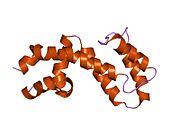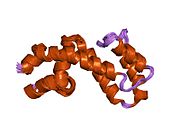Regulator of G protein signaling 4 also known as RGP4 is a protein that in humans is encoded by the RGS4 gene. RGP4 regulates G protein signaling.[5]
Function
Regulator of G protein signalling (RGS) family members are regulatory molecules that act as GTPase activating proteins (GAPs) for G alpha subunits of heterotrimeric G proteins.[6] RGS proteins are able to deactivate G protein subunits of the Gi alpha, Go alpha and Gq alpha subtypes. They drive G proteins into their inactive GDP-bound forms. Regulator of G protein signaling 4 belongs to this family. All RGS proteins share a conserved 120-amino acid sequence termed the RGS domain which conveys GAP activity.[7] Regulator of G protein signaling 4 protein is 37% identical to RGS1 and 97% identical to rat Rgs4. This protein negatively regulates signaling upstream or at the level of the heterotrimeric G protein and is localized in the cytoplasm.[5]
Clinical significance
A number of studies associate the RGS4 gene with schizophrenia,[8][9][10][11] while some fail to detect an association.[12]
RGS4 is also of interest as one of the three main RGS proteins (along with RGS9 and RGS17) involved in terminating signalling by the mu opioid receptor,[13] and may be important in the development of tolerance to opioid drugs.[14][15][16][17][18]
Inhibitors
Interactions
RGS4 has been shown to interact with:
References
- ^ a b c GRCh38: Ensembl release 89: ENSG00000117152 – Ensembl, May 2017
- ^ a b c GRCm38: Ensembl release 89: ENSMUSG00000038530 – Ensembl, May 2017
- ^ "Human PubMed Reference:". National Center for Biotechnology Information, U.S. National Library of Medicine.
- ^ "Mouse PubMed Reference:". National Center for Biotechnology Information, U.S. National Library of Medicine.
- ^ a b "Entrez Gene: RGS4 regulator of G-protein signalling 4".
- ^ Berman DM, Wilkie TM, Gilman AG (1996). "GAIP and RGS4 are GTPase-activating proteins for the Gi subfamily of G protein alpha subunits". Cell. 86 (3): 445–52. doi:10.1016/S0092-8674(00)80117-8. PMID 8756726. S2CID 12427406.
- ^ Popov S, Yu K, Kozasa T, Wilkie TM (July 1997). "The regulators of G protein signaling (RGS) domains of RGS4, RGS10, and GAIP retain GTPase activating protein activity in vitro". Proc. Natl. Acad. Sci. U.S.A. 94 (14): 7216–20. Bibcode:1997PNAS...94.7216P. doi:10.1073/pnas.94.14.7216. PMC 23796. PMID 9207071.
- ^ Stefanis NC, Trikalinos TA, Avramopoulos D, Smyrnis N, Evdokimidis I, Ntzani EE, Hatzimanolis A, Ioannidis JP, Stefanis CN (2008). "Association of RGS4 variants with schizotypy and cognitive endophenotypes at the population level". Behavioral and Brain Functions. 4: 46. doi:10.1186/1744-9081-4-46. PMC 2572614. PMID 18834502.
- ^ Prasad KM, Almasy L, Gur RC, Gur RE, Pogue-Geile M, Chowdari KV, Talkowski ME, Nimgaonkar VL (March 2009). "RGS4 Polymorphisms Associated With Variability of Cognitive Performance in a Family-Based Schizophrenia Sample". Schizophrenia Bulletin. 36 (5): 983–90. doi:10.1093/schbul/sbp002. PMC 2930339. PMID 19282471.
- ^ Dean B, Boer S, Gibbons A, Money T, Scarr E (March 2009). "Recent advances in postmortem pathology and neurochemistry in schizophrenia". Current Opinion in Psychiatry. 22 (2): 154–60. doi:10.1097/YCO.0b013e328323d52e. PMID 19553869. S2CID 21346147.
- ^ Ding L, Hegde AN (March 2009). "Expression of RGS4 splice variants in dorsolateral prefrontal cortex of schizophrenic and bipolar disorder patients". Biological Psychiatry. 65 (6): 541–5. doi:10.1016/j.biopsych.2008.10.026. PMID 19041089. S2CID 21532854.
- ^ Stuart Gibbons A, Scarr E, McOmish CE, Hannan AJ, Thomas EA, Dean B (August 2008). "Regulator of G-protein signalling 4 expression is not altered in the prefrontal cortex in schizophrenia". The Australian and New Zealand Journal of Psychiatry. 42 (8): 740–5. doi:10.1080/00048670802206338. PMID 18622782. S2CID 205398396.
- ^ Hooks SB, Martemyanov K, Zachariou V (January 2008). "A role of RGS proteins in drug addiction". Biochemical Pharmacology. 75 (1): 76–84. doi:10.1016/j.bcp.2007.07.045. PMID 17880927.
- ^ Grillet N, Pattyn A, Contet C, Kieffer BL, Goridis C, Brunet JF (May 2005). "Generation and characterization of Rgs4 mutant mice". Molecular and Cellular Biology. 25 (10): 4221–8. doi:10.1128/MCB.25.10.4221-4228.2005. PMC 1087729. PMID 15870291.
- ^ Garzón J, Rodríguez-Muñoz M, de la Torre-Madrid E, Sánchez-Blázquez P (June 2005). "Effector antagonism by the regulators of G protein signalling (RGS) proteins causes desensitization of mu-opioid receptors in the CNS". Psychopharmacology. 180 (1): 1–11. doi:10.1007/s00213-005-2248-9. hdl:10261/154655. PMID 15830230. S2CID 21952312.
- ^ Georgoussi Z, Leontiadis L, Mazarakou G, Merkouris M, Hyde K, Hamm H (June 2006). "Selective interactions between G protein subunits and RGS4 with the C-terminal domains of the mu- and delta-opioid receptors regulate opioid receptor signaling". Cellular Signalling. 18 (6): 771–82. doi:10.1016/j.cellsig.2005.07.003. PMID 16120478.
- ^ Leontiadis LJ, Papakonstantinou MP, Georgoussi Z (July 2009). "Regulator of G protein signaling 4 confers selectivity to specific G proteins to modulate mu- and delta-opioid receptor signaling". Cellular Signalling. 21 (7): 1218–28. doi:10.1016/j.cellsig.2009.03.013. PMID 19324084.
- ^ Wang Q, Liu-Chen LY, Traynor JR (July 2009). "Differential Modulation of {micro}- and {delta}-Opioid Receptor Agonists by Endogenous RGS4 Protein in SH-SY5Y Cells". The Journal of Biological Chemistry. 284 (27): 18357–67. doi:10.1074/jbc.M109.015453. PMC 2709384. PMID 19416973.
- ^ Jin Y, Zhong H, Omnaas JR, Neubig RR, Mosberg HI (2004). "Structure-based design, synthesis, and activity of peptide inhibitors of RGS4 GAP activity". Regulators of G-Protein Signaling, Part A. Methods in Enzymology. Vol. 389. pp. 266–77. doi:10.1016/S0076-6879(04)89016-5. ISBN 9780121827946. PMID 15313571.
- ^ Roman DL, Talbot JN, Roof RA, Sunahara RK, Traynor JR, Neubig RR (January 2007). "Identification of small-molecule inhibitors of RGS4 using a high-throughput flow cytometry protein interaction assay". Molecular Pharmacology. 71 (1): 169–75. doi:10.1124/mol.106.028670. PMID 17012620. S2CID 22699604.
- ^ Sullivan BM, Harrison-Lavoie KJ, Marshansky V, Lin HY, Kehrl JH, Ausiello DA, Brown D, Druey KM (2000). "RGS4 and RGS2 bind coatomer and inhibit COPI association with Golgi membranes and intracellular transport". Mol. Biol. Cell. 11 (9): 3155–68. doi:10.1091/mbc.11.9.3155. PMC 14982. PMID 10982407.
- ^ Thaminy S, Auerbach D, Arnoldo A, Stagljar I (2003). "Identification of novel ErbB3-interacting factors using the split-ubiquitin membrane yeast two-hybrid system". Genome Res. 13 (7): 1744–53. doi:10.1101/gr.1276503. PMC 403748. PMID 12840049.
- ^ Johnson EN, Seasholtz TM, Waheed AA, Kreutz B, Suzuki N, Kozasa T, Jones TL, Brown JH, Druey KM (December 2003). "RGS16 inhibits signalling through the G alpha 13-Rho axis". Nat. Cell Biol. 5 (12): 1095–103. doi:10.1038/ncb1065. PMID 14634662. S2CID 6798899.
- ^ Druey KM, Sullivan BM, Brown D, Fischer ER, Watson N, Blumer KJ, Gerfen CR, Scheschonka A, Kehrl JH (1998). "Expression of GTPase-deficient Gialpha2 results in translocation of cytoplasmic RGS4 to the plasma membrane". J. Biol. Chem. 273 (29): 18405–10. doi:10.1074/jbc.273.29.18405. PMID 9660808.
Further reading
- Berman DM, Wilkie TM, Gilman AG (1996). "GAIP and RGS4 are GTPase-activating proteins for the Gi subfamily of G protein alpha subunits". Cell. 86 (3): 445–52. doi:10.1016/S0092-8674(00)80117-8. PMID 8756726. S2CID 12427406.
- Levitt P, Ebert P, Mirnics K, et al. (2006). "Making the case for a candidate vulnerability gene in schizophrenia: Convergent evidence for regulator of G-protein signaling 4 (RGS4)". Biol. Psychiatry. 60 (6): 534–7. doi:10.1016/j.biopsych.2006.04.028. PMID 16860780. S2CID 3806917.
- Druey KM, Blumer KJ, Kang VH, Kehrl JH (1996). "Inhibition of G-protein-mediated MAP kinase activation by a new mammalian gene family". Nature. 379 (6567): 742–6. Bibcode:1996Natur.379..742D. doi:10.1038/379742a0. PMID 8602223. S2CID 4362632.
- Heximer SP, Watson N, Linder ME, et al. (1998). "RGS2/G0S8 is a selective inhibitor of Gqalpha function". Proc. Natl. Acad. Sci. U.S.A. 94 (26): 14389–93. doi:10.1073/pnas.94.26.14389. PMC 24991. PMID 9405622.
- Luo X, Popov S, Bera AK, Wilkie TM, Muallem S (March 2001). "RGS proteins provide biochemical control of agonist-evoked [Ca2+]i oscillations". Mol. Cell. 7 (3): 651–60. doi:10.1016/S1097-2765(01)00211-8. PMID 11463389.
- Pashkov V, Huang J, Parameswara VK, Kedzierski W, Kurrasch DM, Tall GG, Esser V, Gerard RD, Uyeda K, Towle HC, Wilkie TM (2011). "Regulator of G protein signaling (RGS16) inhibits hepatic fatty acid oxidation in a carbohydrate response element-binding protein (ChREBP)-dependent manner". J Biol Chem. 286 (17): 15116–15125. doi:10.1074/jbc.M110.216234. PMC 3083217. PMID 21357625.
- Popov S, Yu K, Kozasa T, Wilkie TM (July 1997). "The regulators of G protein signaling (RGS) domains of RGS4, RGS10, and GAIP retain GTPase activating protein activity in vitro". Proc. Natl. Acad. Sci. U.S.A. 94 (14): 7216–20. Bibcode:1997PNAS...94.7216P. doi:10.1073/pnas.94.14.7216. PMC 23796. PMID 9207071.
- Popov SG, Krishna UM, Falck JR, Wilkie TM (June 2000). "Ca2+/Calmodulin reverses phosphatidylinositol 3,4, 5-trisphosphate-dependent inhibition of regulators of G protein-signaling GTPase-activating protein activity". J. Biol. Chem. 275 (25): 18962–8. doi:10.1074/jbc.M001128200. PMID 10747990.
- Srinivasa SP, Bernstein LS, Blumer KJ, Linder ME (1998). "Plasma membrane localization is required for RGS4 function in Saccharomyces cerevisiae". Proc. Natl. Acad. Sci. U.S.A. 95 (10): 5584–9. Bibcode:1998PNAS...95.5584S. doi:10.1073/pnas.95.10.5584. PMC 20421. PMID 9576926.
- Druey KM, Sullivan BM, Brown D, et al. (1998). "Expression of GTPase-deficient Gialpha2 results in translocation of cytoplasmic RGS4 to the plasma membrane". J. Biol. Chem. 273 (29): 18405–10. doi:10.1074/jbc.273.29.18405. PMID 9660808.
- Faraone SV, Matise T, Svrakic D, et al. (1998). "Genome scan of European-American schizophrenia pedigrees: results of the NIMH Genetics Initiative and Millennium Consortium". Am. J. Med. Genet. 81 (4): 290–5. doi:10.1002/(SICI)1096-8628(19980710)81:4<290::AID-AJMG3>3.0.CO;2-Y. PMID 9674973.
- Wang J, Ducret A, Tu Y, et al. (1998). "RGSZ1, a Gz-selective RGS protein in brain. Structure, membrane association, regulation by Galphaz phosphorylation, and relationship to a Gz gtpase-activating protein subfamily". J. Biol. Chem. 273 (40): 26014–25. doi:10.1074/jbc.273.40.26014. PMID 9748280.
- Shaw SH, Kelly M, Smith AB, et al. (1998). "A genome-wide search for schizophrenia susceptibility genes". Am. J. Med. Genet. 81 (5): 364–76. doi:10.1002/(SICI)1096-8628(19980907)81:5<364::AID-AJMG4>3.0.CO;2-T. PMID 9754621.
- Posner BA, Mukhopadhyay S, Tesmer JJ, et al. (1999). "Modulation of the affinity and selectivity of RGS protein interaction with G alpha subunits by a conserved asparagine/serine residue". Biochemistry. 38 (24): 7773–9. doi:10.1021/bi9906367. PMID 10387017.
- Tu Y, Popov S, Slaughter C, Ross EM (2000). "Palmitoylation of a conserved cysteine in the regulator of G protein signaling (RGS) domain modulates the GTPase-activating activity of RGS4 and RGS10". J. Biol. Chem. 274 (53): 38260–7. doi:10.1074/jbc.274.53.38260. PMID 10608901.
- Moy FJ, Chanda PK, Cockett MI, et al. (2000). "1H, 15N, 13C, and 13CO assignments and secondary structure determination of RGS4". J. Biomol. NMR. 15 (4): 339–40. doi:10.1023/A:1008343609739. PMID 10685342. S2CID 37351864.
- Popov SG, Krishna UM, Falck JR, Wilkie TM (2000). "Ca2+/Calmodulin reverses phosphatidylinositol 3,4, 5-trisphosphate-dependent inhibition of regulators of G protein-signaling GTPase-activating protein activity". J. Biol. Chem. 275 (25): 18962–8. doi:10.1074/jbc.M001128200. PMID 10747990.
- Ekelund J, Lichtermann D, Hovatta I, et al. (2000). "Genome-wide scan for schizophrenia in the Finnish population: evidence for a locus on chromosome 7q22". Hum. Mol. Genet. 9 (7): 1049–57. doi:10.1093/hmg/9.7.1049. PMID 10767329.
- Brzustowicz LM, Hodgkinson KA, Chow EW, et al. (2000). "Location of a major susceptibility locus for familial schizophrenia on chromosome 1q21-q22". Science. 288 (5466): 678–82. Bibcode:2000Sci...288..678B. doi:10.1126/science.288.5466.678. PMC 3787922. PMID 10784452.
- Chatterjee TK, Fisher RA (2000). "Cytoplasmic, nuclear, and golgi localization of RGS proteins. Evidence for N-terminal and RGS domain sequences as intracellular targeting motifs". J. Biol. Chem. 275 (31): 24013–21. doi:10.1074/jbc.M002082200. PMID 10791963.
- Chatterjee TK, Fisher RA (2000). "Novel alternative splicing and nuclear localization of human RGS12 gene products". J. Biol. Chem. 275 (38): 29660–71. doi:10.1074/jbc.M000330200. PMID 10869340.
- Ross EM, Wilkie TM (2000). "GTPase-activating proteins for heterotrimeric G proteins: regulators of G protein signaling (RGS) and RGS-like proteins". Annual Review of Biochemistry. 69: 795–827. doi:10.1146/annurev.biochem.69.1.795. PMID 10966476. S2CID 11637673.
- Sierra DA, Gilbert DJ, Householder D, Grishin NV, Yu K, Ukidwe P, Barker SA, He W, Wensel TG, Otero G, Brown G, Copeland NG, Jenkins NA, Wilkie TM (2002). "Evolution of the regulators of G-protein signaling multigene family in mouse and human". Genomics. 79 (2): 177–85. doi:10.1006/geno.2002.6693. PMID 11829488. S2CID 16065132.
- Sullivan BM, Harrison-Lavoie KJ, Marshansky V, et al. (2000). "RGS4 and RGS2 bind coatomer and inhibit COPI association with Golgi membranes and intracellular transport". Mol. Biol. Cell. 11 (9): 3155–68. doi:10.1091/mbc.11.9.3155. PMC 14982. PMID 10982407.
- Dowal L, Elliott J, Popov S, et al. (2001). "Determination of the contact energies between a regulator of G protein signaling and G protein subunits and phospholipase C beta 1". Biochemistry. 40 (2): 414–21. doi:10.1021/bi001923+. PMID 11148035.
- Richardson RM, Marjoram RJ, Barr AJ, Snyderman R (2001). "RGS4 inhibits platelet-activating factor receptor phosphorylation and cellular responses". Biochemistry. 40 (12): 3583–8. doi:10.1021/bi0019242. PMID 11297424.



















